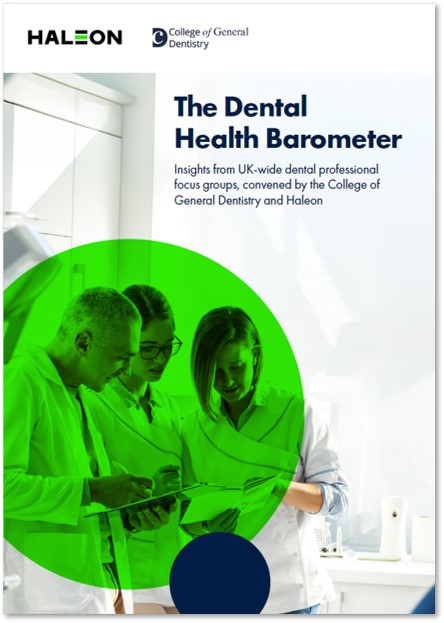The College and Haleon have published a report on improving the provision of preventative oral healthcare.
Preventative care is defined as proactive dental care and advice that helps a patient to take action to maintain a healthy mouth, protecting against tooth decay, gum disease and more serious issues such as tooth loss and negative impacts on general health. The new report, The Dental Health Barometer, provides recommendations based on the experience and insight of general dental professionals on how to bridge the gap between intentions and practical delivery.
The underlying research began last year with a survey of 2,000 UK dental patients and over 500 dental professionals which highlighted inconsistencies in the provision of preventative oral healthcare advice. (A poster summarising those findings is available, as is a webinar examining them in more detail). This has since been built upon with rich discussions held with 77 oral health professionals, from all dental team roles, in focus group meetings hosted at eight general dental practices throughout the UK.
The most consistent finding is that oral health professionals seek redesigned NHS contracts to allow for more time and financial support in giving preventative oral care advice. The research also finds that the profession would like to see more resources devoted to providing nationwide preventative oral healthcare education, and a national communications campaign to tackle oral health misinformation.
The report highlights wider societal barriers to improving preventative oral care, such as competing social media narratives around oral health, diet and appearance; the erosion of long-term patient relationships; a continuing professional skew in some practices towards clinical treatments; and a tendency among non-dental health professionals not to deliver basic oral health messages.
Additional recommendations include:
- Simplifying the government’s Delivering Better Oral Health toolkit to make it more user-friendly, and
- The creation of a consumer-facing version of the Delivering Better Oral Health toolkit
- Working with non-dental health professionals such as health visitors and midwives to inform them of the benefits of preventative oral care
- Greater provision of CPD on the delivery of preventative care
- Encouraging businesses to provide dental cover to employees
- Celebrating team members such as dental hygienists in the mainstream media
- Better use of digital communications such as apps and video streaming platforms
Roshni Karia MCGDent, President of the College, said:
“Our focus groups found that many dentists may feel that they are conducting a lonely battle against entrenched patient habits around oral health care, and doing so within NHS contracts which are unfavourable to providing adequate preventative advice. Our work with Haleon highlights the need to take action to support oral health professionals in a real time of need.”
Bas Vorsteveld, Vice President of Haleon and its General Manager for Great Britain and Ireland, commented:
“With a new Prime Minister in 10 Downing Street, our findings could not come at a more pivotal time for the future of dentistry in the UK. Working alongside the College of General Dentistry, we outline the key opportunities, our jointly developed solutions to safeguard the future of preventative oral care provisions for UK consumers and oral health professionals alike. We welcome the new Labour government’s plan to rescue the UK’s dental sector, but we urge them to go further and make NHS contracts fit for purpose by prioritising prevention. Only by working alongside the profession and industry can the new government make the step-change that UK dentistry clearly needs.”
Haleon, formerly the consumer healthcare division of GlaxoSmithKline, is the manufacturer of well-known oral health products such as Sensodyne, Corsodyl, Aquafresh, Poligrip, Biotene and Parodontax.
The College and Haleon will continue to work together to advocate for improvements in the provision of preventative oral healthcare.
The College and Haleon would like to thank all those College members who volunteered to host a focus group in their practice, and all the members, colleagues and patients who participated in the research.


